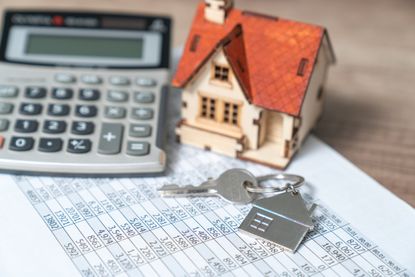Should I overpay my mortgage?
Homeowners are spending record amounts on overpaying their mortgages. We explain what you need to consider before overpaying, and whether it’s better to save or invest your spare cash


Homeowners spent record amounts overpaying their mortgages last year, new data has revealed.
If you want to lower the overall cost of your mortgage and clear your mortgage ahead of schedule, making overpayments is worth considering.
Almost all mortgages allow you to overpay by up to 10% of your outstanding mortgage balance, without incurring early repayment charges. Some lenders, like NatWest, go even further and allow borrowers to overpay by as much as 20%.
Given the increases to mortgage rates seen since the mini-Budget last year, overpaying on your mortgage now before you face remortgaging onto a higher rate can be an attractive idea.
But how does it compare with using the money in some other way, such as putting it in a savings account, investing it or adding it to your pension?
Record numbers are making mortgage overpayments
It’s worth noting the record amounts of mortgage overpayments. Analysis by the Equity Release Council found that in 2022 homeowners made £23.3bn in overpayments.
That’s the equivalent of around £64m a day.
Look After My Bills Newsletter
Get the best money-saving tips, tricks and deals sent straight to your inbox every week. Make sense of your money in partnership with The Money Edit.
The last three months of 2022 saw £6.7bn worth of overpayments made, which is the highest quarterly figure on record. It was also up by a whopping 14% on the previous quarter.
The Equity Release Council pointed to the chaos following the mini-Budget last autumn as a factor in the increase in homeowners opting to make mortgage overpayments. The uncertainty in the financial markets led to mortgage lenders dramatically increasing the interest rates on their products, meaning borrowers would face a sizeable jump in their monthly repayments when remortgaging.
By taking advantage of their existing, lower rate and overpaying, mortgage borrowers could reduce their outstanding balance more quickly, lessening the impact of those higher rates when the time comes to remortgage.
So if you have some spare disposable income left over each month, what is the best way for you to use it?
Compare your mortgage to your savings rate
This is a simple way to work out whether overpaying your mortgage or stashing it in a savings account or cash ISA is the best option.
If your mortgage rate is higher than the rate you’d earn saving, overpaying your mortgage - and therefore reducing the amount of interest you’ll pay - is more effective.
For example, if you have £10,000 in a savings account paying 2% interest, you’ll earn £200 a year. But if you use that £10,000 to overpay a mortgage on a 3% rate, it would reduce your mortgage costs by £300 for the year.
If you took out a mortgage recently, you’re more likely to be on an expensive rate, making it more likely your mortgage rate is higher than the rate you’re earning on your savings. So, overpaying could be the better option.
If you have an older fixed-rate mortgage, it’s probably quite cheap, meaning you may find your savings rate is higher than your mortgage rate - so probably best to keep the money in the savings account.
However, as well as comparing these numbers, think about how you feel about the “overpaying your mortgage” dilemma, and reflect on your own circumstances and financial goals.
Myron Jobson, senior personal finance analyst at interactive investor, comments: “There isn’t a catch-all answer here. There is a lot to be said about overpaying your mortgage. By paying off your home loan faster, you would reduce the overall interest bill. It also has the psychological benefit of putting you one step closer towards achieving the financial milestone of owning your own home outright.”
How much could you save by overpaying?
Your mortgage is likely to be the biggest debt you ever take on, and over the course of the term you’ll be paying thousands of pounds in interest to the lender.
Overpaying will reduce the amount of interest, and help you pay off the mortgage quicker.
For example, someone who borrowed £200,000 over the course of a 25-year mortgage would pay £948 a month, assuming an interest rate of 3%.
If you overpaid by £200 a month, you’d save £21,620 in interest and reduce your mortgage term by six years.
For someone with the same £200,000 mortgage, but a 6% interest rate, overpaying by £100 a month means you'd save £32,017 in interest and reduce your mortgage term by four years.
Have a look at how much you could save by using our mortgage overpayment calculator.
If you are planning to overpay your mortgage…
If it makes sense to overpay your mortgage, make sure you check a few things first:
- Do you have other debts like credit cards or personal loans? If these are more expensive than your mortgage rate, use your spare cash to clear them first.
- Have you got an easy-access emergency cash fund? It’s wise to have a pot of money that you can dip into in case you lose your job or have a large unexpected expense, like paying for a new boiler. Aim to have three to six months’ worth of bills saved before overpaying your mortgage.
- Are there any overpayment penalties? Many lenders let you overpay up to 10% of your mortgage balance each year. Go above this level and you could be hit with some steep penalties. Check your mortgage balance online or give your lender a call to check how much you can overpay penalty-free.
- Make sure each overpayment reduces the mortgage term and not your future repayments. You may need to speak to your lender to ensure this happens. That way, you’ll benefit from cutting the amount of interest you owe and becoming mortgage-free quicker.
- Regularly compare your mortgage rate and savings rate, especially if there’s a big movement with either of them. You may find that one option suddenly becomes more attractive, and you should switch what you’re doing with your spare cash.
If you are planning to save the money…
As long as your emergency savings pot of money is in place, and you’re confident saving the extra cash is a better option than overpaying your mortgage, the next thing to do is find a competitive savings rate.
Here’s our round-up of the best savings accounts.
Jobson notes: “If you find a savings account offering a rate of interest that is higher than that applied on your mortgage, there is also the added benefit of being able to access the cash more easily if needed. Because once a mortgage overpayment is made, you normally lose access to that money.”
However, there are other options besides saving the money. You could also invest it, or pay it into your pension.
According to Rob Morgan, chief investment analyst at the wealth manager Charles Stanley, what you do with your spare cash really depends on personal circumstances, your age, the terms of the mortgage and the interest rate, “and, very importantly, whether you are a risk-taker or more risk-averse”.
Is investing the money a smart decision?
Investing the money instead of overpaying your mortgage or putting it in a savings account could be a better choice IF your investments outperform both the savings rate and the mortgage.
So, if you invest your money for a year and achieve a 7% return, this will have been a smarter move than overpaying a mortgage with a 2.5% rate, or receiving 3.5% in savings interest.
“Although investing may generate higher returns than a mortgage's interest cost or keeping your money in a cash ISA, markets also come with the risk of losses. That uncertainty is a factor in itself,” notes Morgan.
“It comes down to priorities and, quite possibly, how different routes make you feel.”
Jobson agrees: “The key difference is mortgage overpayments offer certainty on how much you would save in interest payments on your loan. Whereas the catch with investing is that returns are not guaranteed.”
You may prefer the peace of mind of reducing your mortgage interest and paying off the debt faster compared to worrying about the performance of financial markets and the potential advantages of investing.
Having said that, over the long term investing has a good track record of beating savings account returns. If you’re happy to take on some risk, investing your spare cash could be a better choice.
What about paying the money into a pension?
One factor that might tilt the balance in favour of investing over paying down your mortgage is if you can get a significant bonus on your money.
Pensions are a great investment scheme in this regard, as tax relief can give your returns a big boost.
Basic-rate tax relief, for instance, adds 25% to the value of your pot, and for higher-rate taxpayers there is an even larger boost. If you have access to a workplace pension, your employer will pay in too, making it a really cost-effective method to save for retirement.
Morgan comments: “This should be maximised to the greatest extent possible before investing elsewhere.”
According to Morgan, some investors pay more into their pension and then use that money to help pay off their mortgage later - but remember that you can’t access that money until age 55 (rising to 57 in 2028). “Bear in mind too that pension rules, and tax relief, can change in the future,” he adds.
Morgan concludes that if the homeowner’s broader finances are in good shape – they don’t have other high-interest debts to pay off and they have built up a fund for emergencies of around six months’ expenditure – both strategies of overpaying your mortgage and investing (whether in a stocks and shares ISA or a pension) can work well.
Ruth Emery is contributing editor at The Money Edit. Ruth is passionate about helping people feel more confident about their finances. She was previously editor of Times Money Mentor, and prior to that was deputy Money editor at The Sunday Times. A multi-award winning journalist, Ruth started her career on a pensions magazine at the FT Group, and has also worked at Money Observer and Money Advice Service. Outside of work, she is a mum to two young children, a magistrate and an NHS volunteer.
-
 Three energy firms pay £8m in switching compensation - has your provider paid out?
Three energy firms pay £8m in switching compensation - has your provider paid out?More than 100,000 customers have received compensation after changing providers, but is now a good time to switch energy suppliers?
By Tom Higgins Published
-
 Save £300 on your supermarket shop with cashback accounts
Save £300 on your supermarket shop with cashback accountsBanks, credit card companies and cashback sites are all offering cashback on your supermarket shop, but can you use them all to max out your savings?
By Vaishali Varu Published
-
 Moving home: why failing to share your new address could cost you money
Moving home: why failing to share your new address could cost you moneyWhen you move home you’ll want to share your new address with family and friends – but being slow to update your contact details with councils, banks and the DVLA can be costly
By Sue Hayward Published
-
 Skipton Building Society to offer deposit-free mortgages for “trapped renters” - everything you need to know about 100% deals
Skipton Building Society to offer deposit-free mortgages for “trapped renters” - everything you need to know about 100% dealsEverything you need to know about how to get a mortgage with no deposit
By Katie Binns Published
-
 Stamp duty: are you entitled to a tax refund worth thousands?
Stamp duty: are you entitled to a tax refund worth thousands?There are plenty of reasons why homebuyers may be entitled to a stamp duty refund, but it’s important to only claim if you’re eligible for a refund (and beware the claims management companies)
By John Fitzsimons Published
-
 House price hotspots: 50 areas where property prices have shot up the most
House price hotspots: 50 areas where property prices have shot up the mostWhich areas have seen the strongest house price growth over the past decade? Discover the towns and locations around the UK where property prices have more than doubled.
By John Fitzsimons Published
-
 Faster mortgage support for Universal Credit claimants – what it means for you
Faster mortgage support for Universal Credit claimants – what it means for youIf you claim Universal Credit, you can now get quicker support with paying your mortgage. We look at when you can get it and how to access it
By Stephanie Baxter Published
-
 Should I fix my mortgage rate?
Should I fix my mortgage rate?Interest rates are expected to rise again on the back of stubborn inflation, before falling next year. We look at the pros and cons of fixing your mortgage rate and what to consider if you need to remortgage soon.
By Stephanie Baxter Last updated
-
 Selling your home: avoid these mistakes to get the best possible price
Selling your home: avoid these mistakes to get the best possible priceFrom boosting kerb appeal to clearing clutter, there are crucial steps to take to ensure you get the highest price when selling your home
By John Fitzsimons Last updated
-
 Interest rates rise to 4.25% - what does it mean for your money?
Interest rates rise to 4.25% - what does it mean for your money?The Bank of England has increased the base rate for the 11th time in a row. We look at whether rates could rise further this year, and what the latest hike means for your mortgage and savings
By Ruth Emery Published